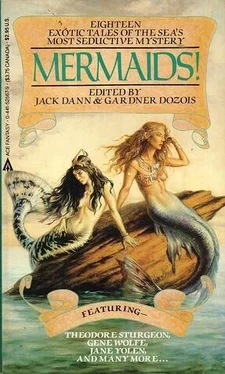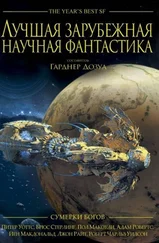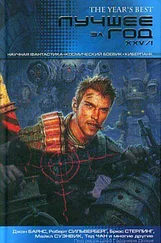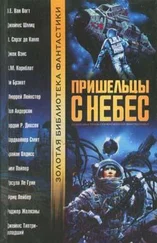Гарднер Дозуа - Mermaids!
Здесь есть возможность читать онлайн «Гарднер Дозуа - Mermaids!» весь текст электронной книги совершенно бесплатно (целиком полную версию без сокращений). В некоторых случаях можно слушать аудио, скачать через торрент в формате fb2 и присутствует краткое содержание. Год выпуска: 1986, ISBN: 1986, Издательство: Ace, Жанр: Фантастика и фэнтези, на английском языке. Описание произведения, (предисловие) а так же отзывы посетителей доступны на портале библиотеки ЛибКат.
- Название:Mermaids!
- Автор:
- Издательство:Ace
- Жанр:
- Год:1986
- ISBN:0-441-52567-9
- Рейтинг книги:5 / 5. Голосов: 1
-
Избранное:Добавить в избранное
- Отзывы:
-
Ваша оценка:
- 100
- 1
- 2
- 3
- 4
- 5
Mermaids!: краткое содержание, описание и аннотация
Предлагаем к чтению аннотацию, описание, краткое содержание или предисловие (зависит от того, что написал сам автор книги «Mermaids!»). Если вы не нашли необходимую информацию о книге — напишите в комментариях, мы постараемся отыскать её.
Mermaids! — читать онлайн бесплатно полную книгу (весь текст) целиком
Ниже представлен текст книги, разбитый по страницам. Система сохранения места последней прочитанной страницы, позволяет с удобством читать онлайн бесплатно книгу «Mermaids!», без необходимости каждый раз заново искать на чём Вы остановились. Поставьте закладку, и сможете в любой момент перейти на страницу, на которой закончили чтение.
Интервал:
Закладка:
That night, with music and stomping on the sand and shouting back and forth over the fire, we made more noise than the sea
THE EIGHT-THIRTY BUS WAS MORE OR LESS ON TIME.
"I don't think they want to go," Joâo's sister said. She was accompanying the children to the Aquatic Corp Headquarters in Brasilia.
"They are just tired," Joâo said. "They should not have stayed up so late last night. Get on the bus now. Say good-bye to Tio Cal."
"Good-bye."
"Good-bye."
Kids are never their most creative in that sort of situation. And I suspect that my godchildren may just have been suffering their first (or one of their first) hangovers. They had been very quiet all morning.
I bent down and gave them a clumsy hug. "When you come back on your first weekend off, I'll take you exploring down below at the point. You'll be able to gather your own coral now."
Joâo's sister got teary, cuddled the children, cuddled me, Joâo, then got on the bus.
Someone was shouting out the window for someone else at the bus stop not to forget something. They trundled around the square and then toward the highway. We walked back across the street where the café owners were putting out canvas chairs.
"I will miss them," he said, like a long-considered admission.
"You and me both." At the docks near the hydrofoil wharf where the submarine launches went out to the undersea cities, we saw a crowd. "I wonder if they had any trouble laying the—"
A woman screamed in the crowd. She pushed from the others, dropping eggs and onions. She began to pull her hair and shriek. (Remember the skillet of shrimp? She had been the woman ladling them out.) A few people moved to help her.
A clutch of men broke off and ran into the streets of the town. I grabbed a running amphiman, who whirled to face me.
"What in hell is going on?"
For a moment his mouth worked on his words for all the trite world like a beached fish.
"From the explosion—" he began. "They just brought them back from the explosion at the Slash!"
I grabbed his other shoulder. "What happened?"
"About two hours ago. They were just a quarter of the way through, when the whole fault gave way. They had a goddamn underwater volcano for half an hour. They're still getting seismic disturbances."
Joâo was running toward the launch. I pushed the guy away and limped after him, struck the crowd and jostled through calico, canvas and green scales.
They were carrying the corpses out of the hatch of the submarine and laying them on a canvas spread across the dock. They still return bodies to the countries of birth for the family to decide the method of burial. When the fault had given, the hot slag that had belched into the steaming sea was mostly molten silicon.
Three of the bodies were only slightly burned here and there; from their bloated faces (one still bled from the ear) I guessed they had died from sonic concussion. But several of the bodies were almost totally encased in dull, black glass.
"Tork—" I kept asking. "Is one of them Tork?"
It took me forty-five minutes, asking first the guys who were carrying the bodies, then going into the launch and asking some guy with a clipboard, and then going back on the dock and into the office to find out that one of the more unrecognizable bodies, yes, was Tork.
Joäo brought me a glass of buttermilk in a café on the square. He sat still a long time, then finally rubbed away his white mustache, released the chair rung with his toes, put his hands on his knees.
"What are you thinking about?"
"That it's time to go fix the nets. Tomorrow morning I will fish." He regarded me a moment. "Where should I fish tomorrow, Cal?"
"Are you wondering about—well—sending the kids off today?"
He shrugged. "Fishermen from this village have drowned. Still it is a village of fishermen. Where should I fish?"
I finished my buttermilk. "The mineral content over the Slash should be high as the devil. Lots of algae will gather tonight. Lots of small fish down deep. Big fish hovering over."
He nodded. "Good. I will take the boat out there tomorrow."
We got up.
"See you, Joâo."
I limped back to the beach.
THE FOG HAD UNSHEATHED THE SAND BY TEN. I WALKED around, poking in clumps of weeds with a stick, banging the same stick on my numb leg. When I lurched up to the top of the rocks, I stopped in the still grass. "Ariel?"
She was kneeling in the water, head down, red hair breaking over sealed gills. Her shoulders shook, stopped, shook again.
"Ariel?" I came down over the blistered stones.
She turned away to look at the ocean.
The attachments of children are so important and so brittle.
"How long have you been sitting here?"
She looked at me now, the varied waters of her face stilled on drawn cheeks. And her face was exhausted. She shook her head.
Sixteen? Who was the psychologist a hundred years back, in the seventies, who decided that "adolescents" were just physical and mental adults with no useful work? "You want to come up to the house?"
The head-shaking got faster, then stopped.
After a while I said, "I guess they'll be sending Tork's body back to Manila."
"He didn't have a family," she explained. "He'll be buried here, at sea."
"Oh," I said.
And the rough volcanic glass pulled across the ocean's sands, changing shape, dulling...
"You were—you liked Tork a lot, didn't you? You kids looked like you were pretty fond of each other."
"Yes. He was an awfully nice—" Then she caught my meaning and blinked. "No," she said. "Oh, no. I was—I was engaged to Jonni... the brown-haired boy from California? Did you meet him at the party last night? We're both from Los Angeles, but we only met down here. And now... they're sending his body back this evening." Her eyes got very wide, then closed
"I'm sorry."
That's it, you clumsy cripple, step all over everybody's emotions. You look in that mirror and you're too busy looking at what might have been to see what is.
"I'm sorry, Ariel."
She opened her eyes and began to look around her.
"Come on up to the house and have an avocado. I mean, they have avocados in now, not at the supermarket. But at the old town market on the other side. And they're better than any they grow in California."
She kept looking around.
"None of the amphimen get over there. It's a shame, because soon the market will probably close, and some of their fresh foods are really great. Oil and vinegar is all you need on them." I leaned back on the rocks. "Or a cup of tea?"
"Okay." She remembered to smile. I know the poor kid didn't feel like it. "Thank you. I won't be able to stay long, though."
We walked back up the rocks toward the house, the sea on our left. Just as we reached the patio, she turned and looked back. "Cal?"
"Yes? What is it?"
"Those clouds over there, across the water. Those are the only ones in the sky. Are they from the eruption in the Slash?"
I squinted. "I think so. Come on inside."
Mrs. Pigafetta Swims Well
by Reginald Bretnor
Throughout the ages, men have yearned for romantic liaisons with mermaids—and the mermaids usually seem more than glad to oblige. But, as the following droll little story suggests, the consequences of such a seaside affair might be just a bit more serious than you bargained for....
Born in 1911, Reginald Bretnor has been active in the SF field since 1947. He is perhaps best known for his "Papa Schimmelhorn" stones, and for the long series of punning joke vignettes known as "Feghoots" (after their continuing protagonist, Ferdinand Feghoot), which he has been publishing, under the name Grendel Briarton since 1956. The Feghoots have been collected in a book entitled (naturally enough) The Compleat Feghoot. As an editor, Bretnor has assembled three major collections of critical articles about SF: Modern Science Fiction, Its Meaning and Its Future; Science Fiction, Today and Tomorrow; and The Craft of Science Fiction.
Читать дальшеИнтервал:
Закладка:
Похожие книги на «Mermaids!»
Представляем Вашему вниманию похожие книги на «Mermaids!» списком для выбора. Мы отобрали схожую по названию и смыслу литературу в надежде предоставить читателям больше вариантов отыскать новые, интересные, ещё непрочитанные произведения.
Обсуждение, отзывы о книге «Mermaids!» и просто собственные мнения читателей. Оставьте ваши комментарии, напишите, что Вы думаете о произведении, его смысле или главных героях. Укажите что конкретно понравилось, а что нет, и почему Вы так считаете.











![Гарднер Дозуа - Книга Мечей (сборник) [litres с оптимизированной обложкой]](/books/427839/gardner-dozua-kniga-mechej-sbornik-litres-s-opti-thumb.webp)